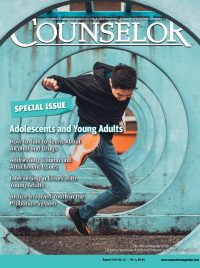Share
As I am writing this column at the peak of the coronavirus (COVID-19) pandemic in early April, I need to prognosticate several months ahead as you will most likely be reading this in July or August. I am (optimistically) predicting that by that time we will have gotten through the worst of the crisis, although it may well be possible that future recurrences lie on the horizon. This column will focus on lessons we can all learn from this cataclysmic pandemic.
Factors Influencing Susceptibility of Substance Users to COVID-19
People who actively misuse substances are often prone to act in an impulsive, irresponsible manner. In the midst of the COVID-19 pandemic, this behavior can place them at increased likelihood of exposing both themselves and others to this dangerous disease.
In addition, many substance users—whether active or in recovery—suffer from serious health issues related to their excessive use of addictive substances that increase their likelihood of succumbing to serious infections. These problems can include various cardiac issues, including heart failure; blood-borne diseases like hepatitis or HIV; and lung damage (Sclar, 2019; NIDA, 2020). As a group, people who actively misuse substances are less likely than the general population to seek out testing and more likely to deny the need for treatment for symptoms suggestive of COVID-19. Additionally, many active substance users live in problematic circumstances that increase both their likelihood of contracting COVID-19 and of exposing others. Foremost among these are the homeless, together with large numbers confined to crowded jails and prisons.
On the bright side, recovering alcoholics and/or addicts with years of sustained sobriety under their belts, and who are conscientiously working their programs, should be in a good position to withstand the pandemic while also making substantial contributions to resolving the myriad related problems that will most certainly lie ahead.
Lessons to Be Learned From the Pandemic
This pandemic has posed a major challenge to everyone to maintain our focus and resiliency in the midst of an unprecedented crisis of major proportion. In addition to the carnage attributable to the disease itself, our entire way of living has been upended, manifested in the form of unimaginable hardship and unprecedented mental-emotional trauma impacting huge segments the population. Millions of Americans have lost both their jobs and their health insurance as a direct result of the pandemic (Stolberg, 2020). Even before this crisis, an estimated 78 percent of workers were living paycheck to paycheck (Friedman, 2019). Our health care resources have been stretched to the max, with doctors, nurses, and other health professionals forced to place their lives at risk on a daily basis. Additionally, they are constantly faced with difficult choices concerning who should be given treatment in the midst of massive shortages of both protective and treatment resources.
Near-death blows have been dealt to brick and mortar retailers and other major segments of the economy, leaving the ultimate fate of hundreds of thousands of businesses and their employees completely up in the air. Furthermore, all this is happening at a time when global trust and cooperation have dipped to an all-time low.
Incredibly, at the national level our previous administration’s initial response to the pandemic was marked by gross denial and inordinate delay (Lopez, 2020; Biesecker, 2020). While former Vice President Mike Pence, charged with handling the coronavirus pandemic, and other respected members of the Trump White House team—most notably Dr. Deborah Brix and Dr. Anthony Fauci—have performed admirably, the lack of decisive forthright leadership from the top set us back close to two months from expeditiously responding to this unprecedented crisis. Former President Donald Trump minimized the crisis, stating, “One day it’s like a miracle, it will disappear” (Lopez, 2020). As late as mid-March 2020 he declared that our nation’s churches should be filled to the rafters on Easter Sunday, celebrating our nation’s magnificent response to bringing the crisis to a rapid halt (Breuninger, 2020; Gerson, 2020).
Speaking in 2015 at the annual Technology Entertainment and Design Conference, philanthropist Bill Gates predicted the current pandemic, drawing on his observations regarding West Africa’s Ebola virus crisis (Rogers, 2020). Gates stated, “If anything kills over 10 million people in the next few decades, it’s most likely to be a highly infectious virus rather than a war” and “We’ve actually invested very little in a system to stop an epidemic, we’re not ready for the next epidemic” (Rogers, 2020).
Unfortunately, Gates’s sober warning fell on deaf ears with our former president and his cohorts. In April 2018, the Trump administration disbanded the entire team in charge of our nation’s pandemic response (Lopez, 2020). This drastic step, coupled with the administration’s repeated calls to cut the budget for the Centers for Disease Control and Prevention (CDC) and other public health agencies (Lopez, 2020), left no doubt that our nation’s leadership was uninterested in strengthening our capability to respond to massive disease outbreaks.
A major silver lining emerging from this pandemic is the day-to-day heroism demonstrated by front-line workers who have placed their lives on the line to ensure that the rest of us remain safe throughout the duration of this crisis. These unsung heroes include grocery and delivery workers, bus and cab drivers, service people making house calls, and millions of others, not the least of which are doctors, nurses, and other health care workers. Health care workers, faced with daunting caseloads and critical shortages of protective face masks, ventilators, and other critical life-saving supplies have been painfully aware for quite some time that this dire situation is constantly subjecting them to totally inhumane conditions that unceasingly place themselves, their patients, and their families at an unacceptable level of risk (Vesoulis, 2020).
Throughout this pandemic we have all witnessed a miraculous wave of people from all walks of life pulling together with massive demonstrations of selfless generosity. Here in Tucson we have witnessed a major caterer sending its employees out to deliver free lunches to grocery workers; retired doctors and other health care workers coming out of the woodwork to pitch in at this time of desperate need; and legions of children, forced out of school due to closures, offering their help to shut-in neighbors. It appears that our species is indeed hardwired to set aside our selfish concerns and band together to serve the common good in the midst of a devastating crisis.
The Ultimate Lesson
Despite a disappointing lack of an early response by the administration in control of our nation at the time the pandemic began, legions of government officials, scientists, health care workers, and other concerned citizens have managed to band together to orchestrate a humane and maximally effective response to the crises posed by this pandemic.
Unquestionably, our uncoordinated patchwork of health care providers is ill-equipped to respond to a crisis of this nature. We are in obvious need of major health care reform to develop a true system dedicated to keeping people well and providing optimal care for all Americans in need of treatment.
In a column in The Washington Post, Fareed Zakaria poignantly states, “We are in the early stages of what is going to become a series of cascading crises, reverberating across the world” (2020). In his words, a major barrier to marshaling an effective response to these growing challenges is the sobering reality that both governmental and private entities throughout the world are awash in debt. Witness that our government is already mortgaging the futures of our grandchildren to the tune of several trillion dollars in a desperate effort to keep both our economy and the livelihoods of a large proportion of our population afloat.
Author Max Brooks makes a perceptive observation that the initial inability of our global community to effectively respond to this pandemic is largely attributable to the fact that for decades our country and other major nations have been caught up in a self-serving effort to “build a society based on comfort at the expense of resilience” (Morrison, 2020). He adds that in the process we have slowly been dismantling all the safeguards that have kept us alive and healthy.
We are at a major turning point that will continue to upend the way of life we have grown accustomed to. We are faced with an onslaught of seemingly insurmountable challenges, including the combined threats to our children’s future posed by further cataclysmic pandemics, the onslaught to our planet’s livability posed by global climate change, and the prevailing climate of extreme distrust and discord among both our nation’s people and people throughout the world.
Time is rapidly running out. Hopefully this challenge to the way of life we have grown accustomed to will motivate all of us to wholeheartedly work together to foster the greater good of all people throughout the planet—our survival as a species depends on it.
References
- Biesecker, M. (2020). US ‘wasted’ months before preparing for coronavirus pandemic. Retrieved from https://apnews.com/article/virus-outbreak-health-us-news-ap-top-news-politics-090600c299a8cf07f5b44d92534856bc
- Breuninger, K. (2020) Trump wants ‘packed churches’ and economy open again on Easter despite the deadly threat of coronavirus. Retrieved from https://www.cnbc.com/2020/03/24/coronavirus-response-trump-wants-to-reopen-us-economy-by-easter.html
- Friedman, Z. (2019). 78 percent of workers are living paycheck to paycheck. Forbes. Retrieved from https://www.forbes.com/sites/zackfriedman/2019/01/11/live-paycheck-to-paycheck-government-shutdown/?sh=d8ea3164f10b
- Gerson, M. (2020). Opinion: Trump defiles Christianity’s holiest day. The Washington Post. Retrieved from https://www.washingtonpost.com/opinions/trumps-goal-to-open-the-economy-by-easter-exposes-his-moral-sickness/2020/03/26/58b40576-6f7b-11ea-a3ec-70d7479d83f0_story.html
- Lopez, G. (2020). The Trump administration’s botched coronavirus response, explained. Retrieved from https://www.vox.com/policy-and-politics/2020/3/14/21177509/coronavirus-trump-covid-19-pandemic-response
- Morrison, P. (2020). Column: Max Brooks: We’ve had plans for a crisis like coronavirus for years. Why aren’t we using them? Los Angeles Times. Retrieved from https://www.latimes.com/opinion/story/2020-04-01/column-max-brooks-americans-may-be-the-slowest-to-fight-but-were-the-best-at-finishing
- National Institute on Drug Abuse (NIDA). (2020). Health consequences of drug misuse. Retrieved from https://www.drugabuse.gov/drug-topics/health-consequences-drug-misuse/introduction.
- Rogers, P. (2020). Coronavirus: Bill Gates predicted pandemic in 2015. The Mercury News. Retrieved from https://www.mercurynews.com/2020/03/25/coronavirus-bill-gates-predicted-pandemic-in-2015/
- Sclar, K. (Ed.). (2019). Dangers of drug addiction. Retrieved from https://luxury.rehabs.com/drug-addiction/dangers-of-drug-addiction/
- Stolberg, S. G. (2020). Millions have lost health insurance in pandemic-driven recession. The New York Times. Retrieved from https://www.nytimes.com/2020/07/13/us/politics/coronavirus-health-insurance-trump.html
- Vesoulis, A. (2020). I’m mentally and physically exhausted: Health care workers battling coronavirus are running out of protective gear. Time. Retrieved from https://time.com/5808992/healthcare-workers-lack-ppe/
- Zakaria, F. (2020). This is just the first in a series of cascading crises. The Washington Post. Retrieved from https://www.washingtonpost.com/opinions/global-opinions/this-is-just-the-first-in-a-series-of-cascading-crises/2020/04/02/45e8cc52-7510-11ea-87da-77a8136c1a6d_story.html

John Newport, PhD
John Newport, PhD, is an addiction specialist, writer, and speaker living in Tucson, Arizona. He is the author of The Wellness-Recovery Connection: Charting Your Pathway to Optimal Health While Recovering from Alcoholism and Drug Addiction (2004). He is available for workshops, conference presentations, and staff trainings on all aspects of wellness and recovery, as well as for personal wellness and recovery coaching by phone. He can be reached at healingtucson@hotmail.com.












 Counselor Magazine is the official publication of the California Association of Addiction Programs and Professionals (CCAPP). Counselor offers online continuing education, article archives, subscription deals, and article submission guidelines. It has been serving the addiction field for more than thirty years.
Counselor Magazine is the official publication of the California Association of Addiction Programs and Professionals (CCAPP). Counselor offers online continuing education, article archives, subscription deals, and article submission guidelines. It has been serving the addiction field for more than thirty years.